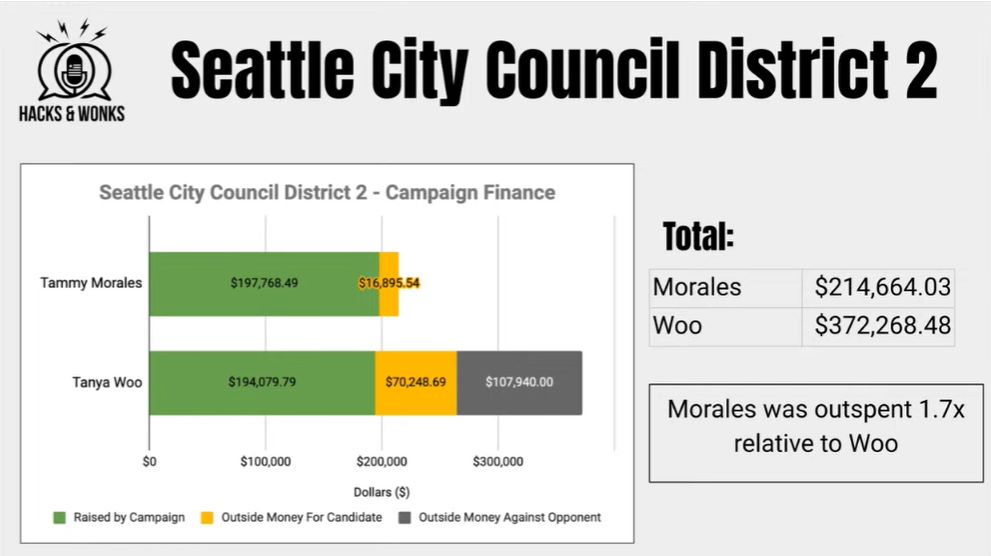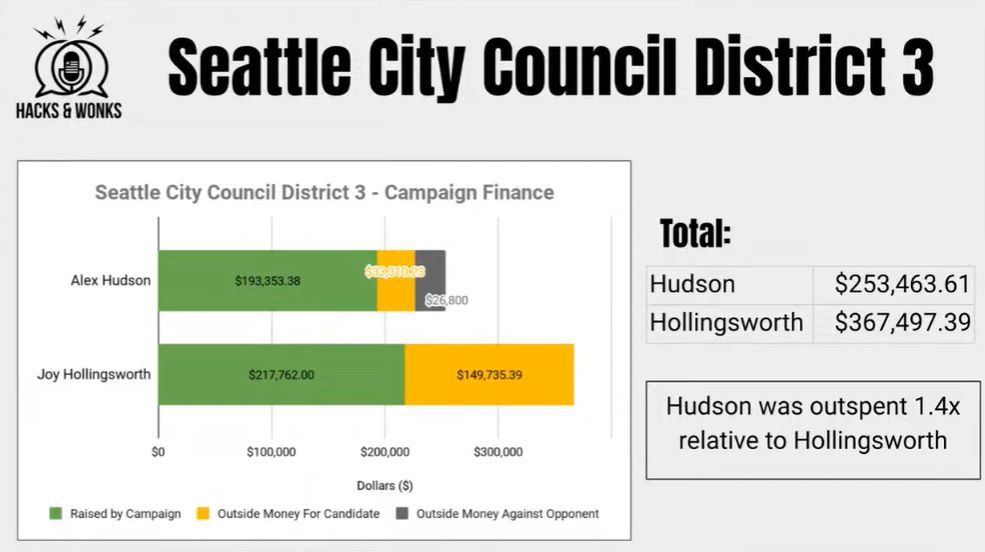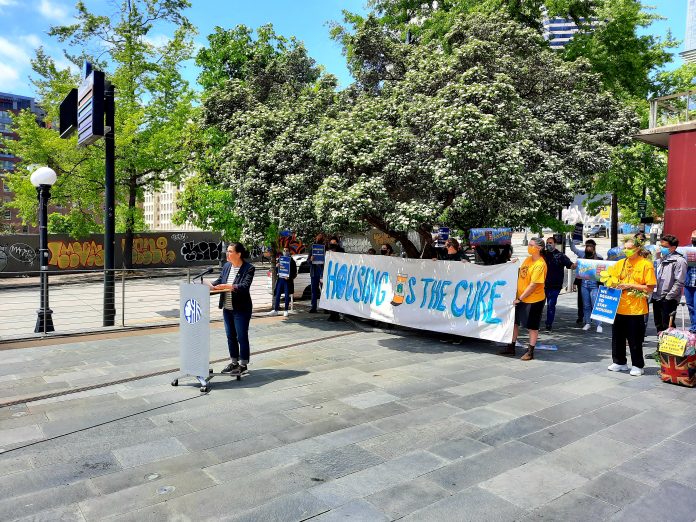
Centrists cleaned up, but progressives have an opportunity to turn the tables next time.
The 2023 election did not go the way progressives wanted. Four of five candidates that Seattle Mayor Bruce Harrell endorsed won. Meanwhile one of the two races that Harrell sat out — Districts 2 and 7 — also went the mayor’s way, with conservative-leaning Bob Kettle pledging to back the mayor’s public safety policies. Harrell wanted a centrist majority on city council; he got it.
Centrists opened up big leads on election night, and only two candidates were able to mount comebacks. Below are the latest results by district, which were updated November 20th with the Urbanist-endorsed candidate emboldened:
- Rob Saka 54.1% defeats Maren Costa 45.5% (-8.7 points)
- Tammy Morales 50.7% defeats Tanya Woo 49.1% (+1.6 points)
- Joy Hollingworth 53% to Alex Hudson 46.7% (-6.3 points)
- Maritza Rivera 50.3% to Ron Davis 49.4% (-0.85 points)
- Cathy Moore 64.1% to ChrisTiana ObeySumner 35.6% (-28.6 points)
- Dan Strauss 52.3% to Pete Hanning 47.2% (+5.1 points)
- Bob Kettle 50.8% to Andrew Lewis 48.9% (-1.9 points)
The takes are flying for why Seattle progressives underperformed again in 2023 just like they did in 2021. The most prevalent analysis of the election, especially in centrist media, is that public safety was the dominant issue of the election and voters trusted the centrist slate on the issue more than progressives. There’s polling data to back this up; so, perhaps the more pressing question is why Seattle odd-year voters have so much more trust in centrists than progressives when the public safety policies they support — hiring more cops and also rolling out civilian response programs — often appear similar at face value, with potentially different degrees of emphasis.
Asked what would be different about the incoming council, Harrell confirmed he expected them to be more in line with his views and back up his policies, particularly on public safety, alluding to his push to roll out controversial “ShotSpotter” gunshot detection technology.
“So first of all, I think that this council will be aligned with me on public safety strategies, that they’re willing to try new things, such as technology,” Harrell told KING 5. “I think our old council, quite frankly, were sort of coming along with the things that I want to try.” Meanwhile the new council “they’re in there with me to help recruit officers and do that kind of work.”
A few more narratives or anxieties have emerged beyond the public safety explanation. Did progressives run on the wrong issues, with their messages too wonky, varied, and complicated to break through? Did they tack too much to the center? Did they tack too much to the left? Did they have the right platform but fail to communicate it effectively? Did they simply get outspent and out-organized even though their message was pretty on the mark?
Across the seven races, it’s probably safe to say it’s a number of these factors at play and the reasons for losing weren’t exactly the same thing in every race. The Urbanist Elections Committee will host a panel analyzing the election and tackling that question on Wednesday, November 29 in Belltown.
One thing the centrist side did incredibly well was blurring the line with their opponents on issues where they were weak. What’s progressive anyway, right? Aren’t we all left of center in Seattle? Whether you believe that or not, it worked at making most Seattle voters, who generally characterize themselves as progressives, feel comfortable voting for the business-backed moderate candidate. These candidates splashed phrases like “will bring common sense back” and “solutions-oriented” on their mailers and websites, but were very light on details.
Without more policy details, it’s hard to judge whether they are more progressive-leaning or centrists or outright conservatives. While progressives took considerable efforts to brand progressive opponents as extremists and radical, the left failed to brand their opponents and land attacks in an effective manner. Getting progressive messaging out is an uphill battle, but not one the various campaigns or the movement writ large fought very well.
While centrist pundits and leaders have expended incredible energy to brand progressives as extreme and out of touch, progressives have not been nearly as effective at defining their opponents rather than letting them define themselves. The centrists bristle at being labeled conservatives since they consider themselves mainstream Democrats in line with President Joe Biden. However, opposing raising new revenue to close a large looming budget shortfall and instead focusing on program cuts to make up the difference is a classic fiscal conservative position.
In fact, the campaigns that centrists ran bear some similarities to races that Republicans run for suburban seats, with the emphasis on backing the blue and painting opponents as hellbent on defunding and undermining the police even when that’s at odds with their statements and actual positions.
Kyler Parris, campaign manager for D1 candidate Maren Costa noted the conservative themes on display this cycle.
“I’d love for someone to explain how running a city council race entirely on standing with police/increasing police budget, jailing drug users, and increasing homeless sweeps is all ‘centrist.’” Parris tweeted. “Those are, without a doubt, conservative policies backed by conservative donors.”
But calling them conservatives just leads to tedious exchanges about how they’re actually mainstream Biden Democrats and so forth. Let’s call them by their own branding: Commonsense Moderates, but we can shorten it to ComMods or Commodities. These known commodities were highly effective at raising vast sums from the business community — the National Realtors Association, the master builders, and a handful of local real estate tycoons have been particularly active this cycle.
As I wrote in 2021, Seattle’s centrist machine is formidable; part of the issue is the left’s continued penchant to underestimate the political machine against them and not develop a viable strategy to win now, rather than fall on righteous swords to prove a point and maybe win in a decade. Yes the commodities outspent the progressives by a roughly two-to-one margin, but that’s basically the same every election — even when they have a progressive wave like in 2019.
With the right message and strategy, progressive should be able to win even when they are outspent. That didn’t happen this year. The centrist commodities ran as a fairly united slate with similar themes and remarkable message discipline. Progressives ran as a loosely associated hodgepodge.
District 1 – Business slays labor
Rob Saka ended up winning rather easily despite Maren Costa’s ability to unite labor, urbanists, environmentalists, and all of her primary opponents against Saka. Thus, one thing this race showed was that endorsements from eliminated primary challengers in a race don’t matter that much. Saka did just fine without them. He had labor fairly united against him as well, but that did not slow him down. He has the endorsement of Mayor Bruce Harrell and the Seattle Times, and that proved to be enough.
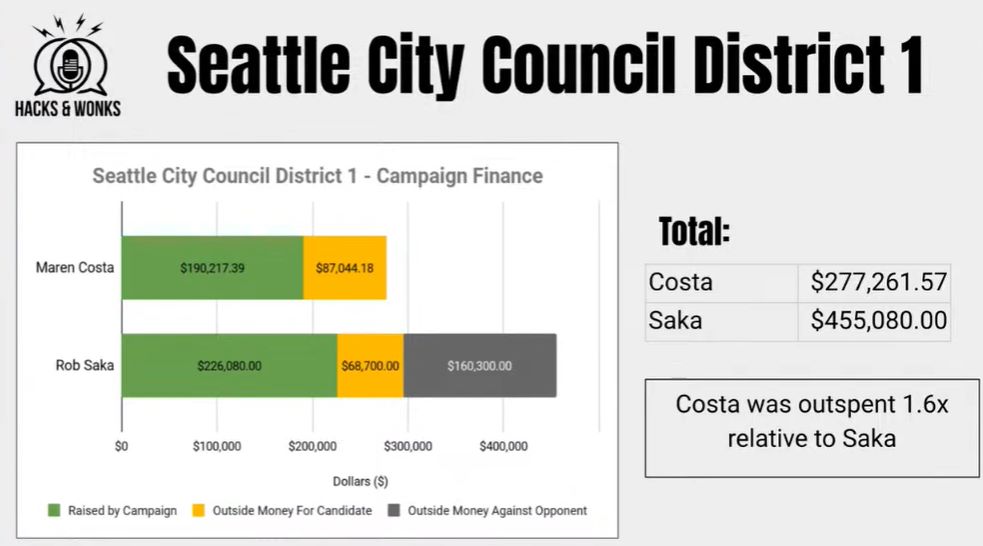
Saka was able to portray himself as taking the city in a new direction even as policy specifics he was able to lay out were largely in line with the status quo. In fact, hesitancy to raise new revenue could preclude large new initiatives on key themes like public safety, housing stability, homelessness and so forth. Saka’s history of fervently opposing a road divider safety feature added to Delridge Way with the RapidRide H Line — even comparing it to Trump’s border wall — didn’t come to light until after the election via a PubliCola story.
Messages around climate change didn’t appear to break through this cycle. Costa framed herself as the climate candidate and labor champion. She lost by 8.7 points as Saka seemed to own the issue of public safety. Saka pledged, “I will provide a more thoughtful, balanced approach to public safety that includes: policing and enforcement, police reform and officer accountability, and civilian-led responses to certain crises situations.” Effectively this is the all-of-the-above strategy the city is already embarked on. But apparently it sounds good when framed in opposition to “defund” extremism.
District 2 – Tammy Morales withstands the centrist tide
Progressives can take solace in incumbent Tammy Morales winning her race to give them a champion on council. While Morales was down nine points on election night, late returns have seen a roughly 11-point swing toward the progressive in this race. Morales is set to win by nearly two points. While Morales had won handily in 2019, this was a close race.
Morales chose not to run from her record on police accountability, and, while it was close, this election showed D2 voters were with her. Her focus on upstream solutions (rather than more police and prison time) cut against the grain of other winning campaigns, but she pulled it off. “Data show[s] us that the safest communities are the ones that are fully funded, not the ones with the most police. That’s why my focus has always been keeping people in their homes, ensuring access to healthy food and good-paying jobs, and empowering young people to be community leaders,” Morales wrote on her issue page.
Beyond withstanding the siege on the issue of public safety, Morales also can point to a strong record on social housing, road safety, climate, and economic justice and that likely earned her votes from other quarters. As a steadfast vote for the JumpStart Seattle corporate payroll tax — which is popular with voters — it was clear she was willing to raise progressive revenue to pay for her priorities while making the city’s tax code less regressive. Morales was able to overcome the headwinds against her and prevail.
District 3 – Joy coasts, turnout craters
After electing a socialist in two straight elections plus a recall, District 3 seemed like safe terrain for progressives to hold. But then something weird happened. First, centrists ran a strong candidate in Joy Hollingsworth, who had major appeal in the Central District, where her family has deep ties going back generations. Progressives thought they had a fairly strong candidate to go toe-to-toe in Alex Hudson, but a few key blunders proved decisive, leading to a six-point loss.
Hollingsworth hired arguably the most high-powered political consulting firm in the region: Christian Sinderman’s Northwest Passage. Hollingsworth was able to position herself as fairly progressive even as her support from the business community remained rock solid, blurring the line between progressive and centrist in the race. It’s effectively the strategy Sinderman used in electing Ed Murray mayor back in 2013.
Out of the gates, Hudson hired centrist-whisper Sandeep Kaushik as her campaign consultant, taking the strategy of ‘if you can’t beat ‘em, hire their consultant.’ This move raised eyebrows and caused some unease in progressive and labor circles. Kaushik’s work has included consulting on behalf of the last three centrist commodity mayors (Harrell, Jenny Durkan, and Ed Murray) and lobbying for corporations like Lyft and Comcast. With Lyft and other Kaushik clients fighting unionization efforts and workers rights legislation, the hire did not build trust with labor.
If Hudson’s hope was that Kaushik could help her campaign build a bridge to the business community while developing an effective strategy to insulate herself from attacks from the right, that did not come to pass. Instead the Kaushik association and general campaign disorganization around how to secure the MLK Labor Council nod led the Hollingsworth camp to steal that key endorsement out from under them, using a superior knowledge of MLK Labor procedures and better organizing among voting members. It’s not at endorsement they should have taken for granted facing a strong challenger.
In short, the overtures Hudson made to the center didn’t get her much, but it did cost her labor support and did nothing to combat the trend of lower turnout among the key progressive base of renters and young people. Kshama Sawant garnered more than 22,000 votes in 2019 (when the D3 population was smaller, to boot). In 2023, Hudson turned out less than 16,000 votes. The lack of contrast or fiery messaging seemed to mean more voters just sat the election out. Overall, D3 voters cast 42,956 votes in 2019, but less than 35,000 in 2023.
District 4 – Davis comeback comes up just short
Fellow known commodity Maritza Rivera will take the reins from Alex Pedersen in D4, but it was by the skin of her teeth. Davis trails by just 243 votes or 0.66 points at time of post. Ballot counts have slowed to a trickle, effectively ruling out a comeback. Davis was able to unite progressives early in his race, but facing the same challenging dynamics as the other progressives, he still couldn’t close the deal.
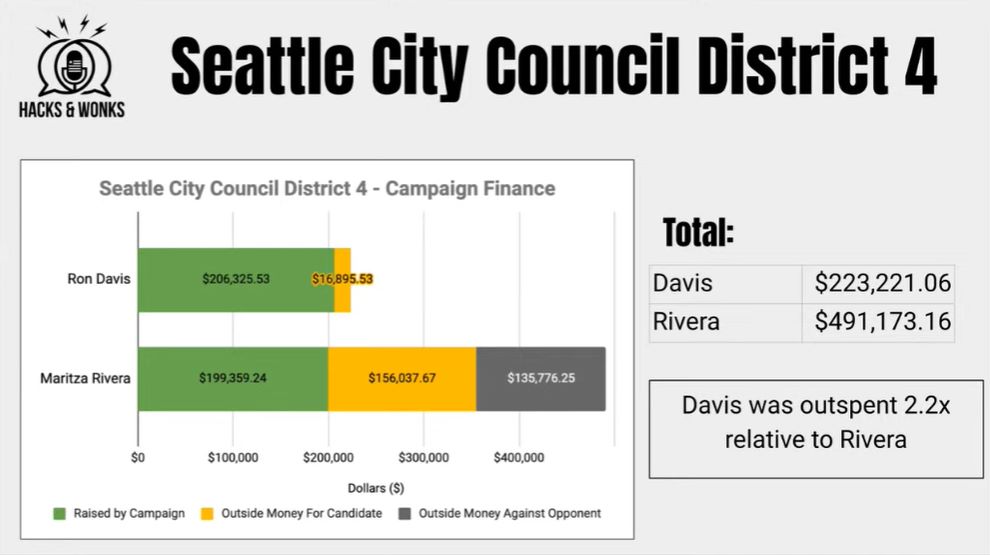
After running as a strident progressive urbanist in the primary, Davis made some overtures to not-in-my-backyard activists in the final months of the election, publicizing the endorsement of Pedersen staffer and long-time neighborhood activist Toby Thaler. Early vote returns suggest Rivera still dominated in wealthy single family areas of the district — the same strategy that carried Pedersen to victory in D4. But the move could have sapped some enthusiasm in urbanist and progressive circles, with PubliCola’s Erica Barnett flagging the move and also making hay of Davis signing a pledge to not upzone “The Ave” in the U District.
Another possibility is that minor endorsements and positions on upzoning the Ave made no discernible difference in the race, but the failure to land on an issue that really fired up the progressive base did hurt Davis. The Urbanist reported that youth (ages 18 to 24) turnout was down 25% in D4 over last cycle. In a close race, that could have made all the difference.
It wasn’t just the youngest voters who didn’t turn out; turnout was down across demographics. Overall D4 had 12% more votes cast in 2019 even with a smaller population. Turnout was 55% then versus 48% this year. Shaun Scott garnered 15,568 votes in 2019 while Davis won just shy of 14,000. D4 is trending toward being a progressive council district, but with abysmal turnout it might never get there.
Davis seemed to have momentum in the primary in part due to unabashedly progressive values and a stridently pro-housing message. Rivera was able to hug his positions and make it seem like she had solutions too, but Davis did not respond well enough to continue making a progressive contrast while effectively painting his opponent as a phony posing on these issues.
As Seattle embarks on a pivotal Comprehensive Plan update, Rivera’s housing affordability campaign plan is a very lightly sketched ‘both-sides’ word salad: “Expanding housing options like quad-plexes, townhomes, row houses, and mixed-use development, especially along transit corridors is essential to ensuring that working families can live near work. It is unfair for blue collar workers to have to face long commutes after putting in a full day’s work. Unfortunately, we’ve let bad politics pit us against each other. On one side is more density seemingly no matter the impact on our neighborhoods and on the other are those that want to preserve what makes this City such an amazing place to live. This is a false dichotomy that has led to our city both failing to address our affordability crisis while at the same time approving developments that hurt and displace communities.”
Perhaps Rivera has a magical “good politics” solution that will lead the city to join hands and build a ton of housing and make it affordable for everyone without upsetting anyone along the way. That would be stupendous. Voters will have four years to figure out what Rivera means by her bromides around hot button issues. Hopefully they’ll be happy with the results.
District 5: Cathy Moore cleans up
District 5 was the most lopsided race. Former King County Superior Court judge Cathy Moore pulled off a 28-point win over social equity consultant ChrisTiana ObeySumner. Though in the centrist lane, Moore ran to the left of most of the commodity field like Rivera and that seemed to cause her to soak up all the oxygen in the room, so to speak. ObeySumner defined themself as a leftist wonk. Given a mildly progressive alternative with much more institutional support, D5 voters made that choice instead.
Part of Moore’s advantage was structural. Moore was a prolific fundraiser and ObeySumner raised the least of any candidate. Moore was a full-time campaigner with a former judge’s gravitas and pension. ObeySumner was a part-time campaigner because they needed to keep their day job to pay their bills. Moore hired Sinderman’s Northwest Passage to be her consultant and took on an air of inevitability that helped her win the MLK Labor endorsement even from the center lane.
ObeySumner made it through the primary on the power of The Stranger endorsement. The Urbanist Elections Committee backed Nilu Jenks in the primary, but The Stranger found Jenks’ diplomatic answer on tax policy disqualifying. ObeySumner edged Jenks out by a few points with Moore well ahead. In the general election, the tactic of chastising progressives to get off their butts didn’t close the gap for ObeySumner.
“Moore won the primary, and that made some so-called progressives preemptively admit defeat, as though ObeySumner cannot win an election,” The Stranger wrote in their endorsement. “News flash, bozos: They can. You just have to get your ass to the ballot box and tell all your progressive North Seattle friends to do the same. Vote ObeySumner.”
A business-backed political action committee spent $113,000 in negative campaigning against ObeySumner, much of it on mailers branding them a defund-the-police extremist. That sum is about as much as ObeySumner spent on their whole campaign. As a result, their message was drowned out, with Moore also having $173,000 to spend on positive campaigning.
Hey, look y'all! New IE attack ads just dropped. It's a full 8.5×12 sheet 😅🙃🤦🏾
— ChrisTiana ObeySumner (@CObeySumner) November 4, 2023
This is comical pic.twitter.com/j8KRpeYcvH
Losing by such a large margin, it’s safe to say the campaign didn’t just lose from having their message drowned out, but also suffered from not calibrating it well to begin with. For example the first sentence of ObeySumner’s priorities page reads “The lack of affordable housing in Seattle is a complex issue that requires a multifaceted approach.” While it’s a true statement, it’s not the type of rallying cry that galvanizes fickle off-year voters. For better or worse, voters want to hear help is on the way soon. Explaining how complicated the problems are isn’t often effective voter persuasion.
District 6: Strauss triangulates and survives
Dan Strauss was the second incumbent to survive the 2023 election, but he took a much different strategy than Morales did. While Morales ran on her progressive record, Strauss ran from his, to some extent, and cozied up to Mayor Harrell. Strauss’ loyalty earned him Harrell’s endorsement and he was also the only Stranger-lane candidate to benefit from a fundraising advantage rather than a deficit.
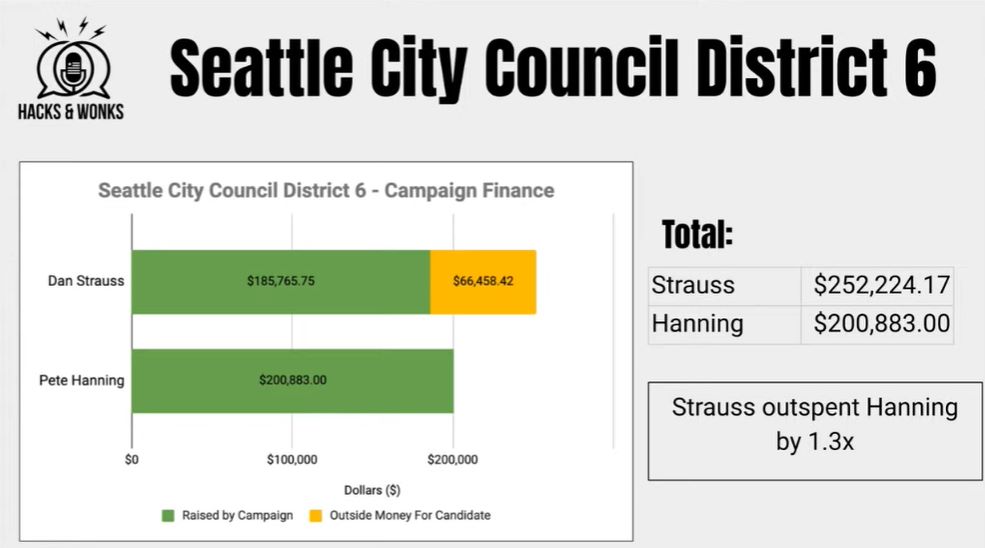
Opponent Pete Hanning ran a listless campaign, which also helped Strauss. No political action committee emerged to funnel campaign cash on behalf of Hanning. Hanning tried to ding Strauss for his 2020 support for reining in police spending and the harsher tactics the department was deploying, such as chemical weapons. However, Strauss took a big swing with a campaign mailer loudly proclaiming that defund was a mistake and that he supports fully funding the Seattle Police Department and the mayor’s plan to hire 500 cops.
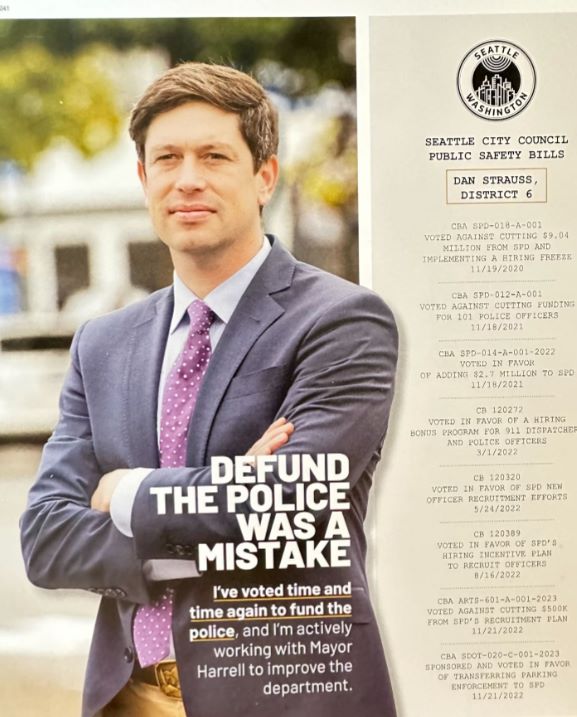
Deprived of his wedge issue and the business-backed megaphone to broadcast it, Hanning’s campaign fell flat. Still, the fact he came within five points of dethroning Strauss without any outside support is also eye-opening and shows the anxious, anti-incumbent mood this cycle.
There is also a case that District 6 remains solid progressive ground even after redistricting added conservative western Magnolia. The district again led the city in turnout rate, with 52% while every other district was in the 40s. Voters didn’t have a full-throated progressive option, but they picked the more progressive of the two. Strauss probably ran farther to the center than he needed to, and hopefully future D6 candidates can strike the right note for this district.
District 7: Lewis loses base then loses election
While his two colleagues took diverging strategies to survive re-election, Lewis basically split the difference with alternating appeals to the left and the center. It did not work for him. Conservative challenger Bob Kettle edged him out by about 444 votes or two percentage points.
Unlike Hanning, Kettle had enthusiastic support from the city’s wealthy elite. $178,000 in outside money poured in on Kettle’s behalf. Still the D7 race was a close one and if a few more things had broken for Lewis, he could have easily won. One key ingredient that was missing for him this cycle was strong labor support.
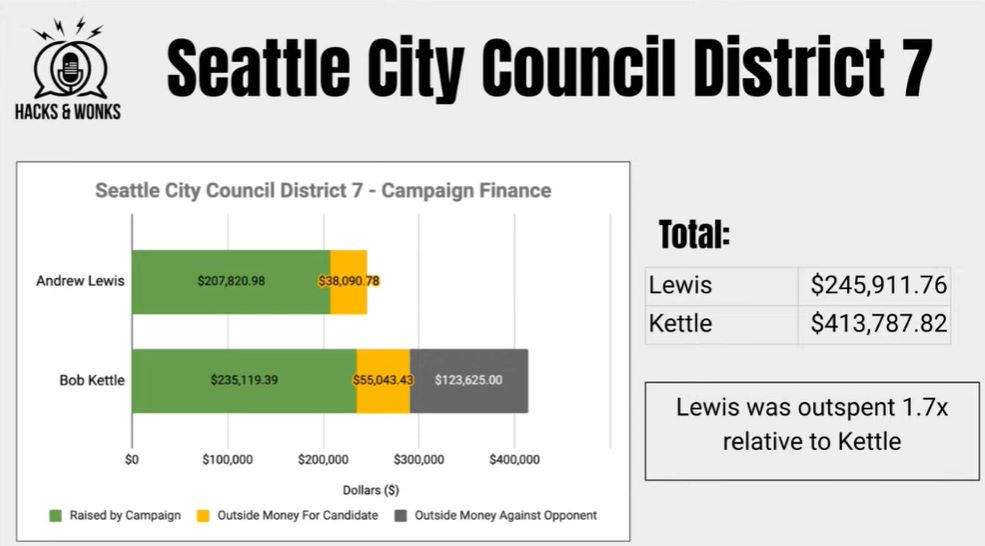
Unite Here Local 8, a union which represents hotel workers, spent heavily helping to elect Lewis in 2019, dropping $350,000 into the race. While Lewis enjoyed MLK Labor endorsements and several others again in 2023, that backing was much more tepid and did not come with the same financial muscle. Unite Here didn’t even endorse in the race, let alone invest in it this time around. Without a labor spending spree to counterbalance business spending, Lewis was outspent two to one like most of the rest of the progressive field.
In a familiar story, much of the outside spending was spent hammering Lewis for his stances on policing. Councilmember Sara Nelson, who was very active on behalf of the commodity slate, provided fodder for the attacks with a breathless quote saying Lewis’ vote against her drug prosecution bill literally cost lives. Locking drug users up or coercing them into treatment with jail time has a poor track record at preventing drug deaths or encouraging long-term sobriety, but it was scripted to be the attack line this cycle and Nelson used it to the fullest.
The brutal, fact-free attack on a colleague appeared to be very damaging all the same. Nelson could very well be making a bid for council president in January and odds are she has a loyal vote in Kettle. Taking such shots at a colleague might make progressives wary of working with Nelson, but on the current council that’s not much of a problem for her. The centrists now have a supermajority.
The irony of it is that Lewis backtracked and voted for the drug prosecution bill in September after casting the deciding vote against it in June. In his vote against, Lewis cited the lack of new funding for treatment programs or tangible commitment from City Prosecutor Ann Davison, who had just unceremoniously axed a successful community court diversion program. He pledged to support the underlying concept of empowering the City Attorney to prosecute public drug use and dealing once the commitment to diversion was stronger, and he did get some minor concessions in the revised version in September. However, the political damage was already done by that point, with his opponents seizing on it as a line of attack. Voting for the bill in September did not cause his opponents to back off, but it may have sapped votes from people excited he had made a stand for criminal justice reform in June. And broader than this particular issue area, it furthered the narrative of him as a waffler.
Meanwhile, Kettle coasted by with a campaign that didn’t even try to put a housing plan together and papered over his troubling record of opposing new housing as a leader on the Queen Anne Community Council. Kettle’s campaign issues page says “We must also significantly increase the construction of affordable housing at all levels, across the city” and then proceeds to offer no hint of how he’d accomplish that. His hesitancy to raise taxes will make scaling up affordable housing production and expanding homeless shelters very hard, and he strategically avoided situations where he’d have to answer for these holes in his plans.
Kettle was the only candidate out of all 14 in the general election to decline an invitation to participate in a forum on the Comprehensive Plan hosted by a coalition led by the Housing Development Consortium and Futurewise, which includes The Urbanist. Kettle also skipped The Urbanist’s questionnaire and endorsement interview where he would have been pressed to sketch out his approach to adding housing and funding the social services he says he wants.
It’s odd that the election may have been decided by Lewis delaying a drug prosecution bill which history suggests won’t be effective anyway by a mere three months before voting for it after all. Meanwhile, Kettle barely had to answer for his sketchy campaign plans. But that is the maturity of our political system at the moment.
Where to go from here
Both Morales’s fire-up-the-base strategy and Strauss’s own-the-center strategy can win. Lewis’s tactic of not really picking a side didn’t work, but D7 is also the least favorable district for progressives of the three currently. Is it easier to follow in the footsteps of Morales or Strauss? It may depend on the district. But one thing to consider: Running to the center could also lead to pyrrhic victories for progressives, limiting their ability to deliver progressive policy wins once in office.
Voters appear highly motivated by the issue of public safety right now and winning this issue could turn the tide for progressives. But no single campaign can solve this. It takes progressives messaging on the issue consistently in-between elections to begin raising awareness of progressive solutions for public safety. It will also take a group effort to force housing issues into the center of our political debate, creating another policy space where progressives have the edge.
Storming back into power should be possible, because progressive urbanists have made gains in other parts of the region. There’s no reason Seattle should be any different.
Correction: An earlier version of this article incorrectly stated that Mayor Harrell endorsed Tanya Woo, but he did not endorse anyone in D2. We regret the error.
Doug Trumm is publisher of The Urbanist. An Urbanist writer since 2015, he dreams of pedestrianizing streets, blanketing the city in bus lanes, and unleashing a mass timber building spree to end the affordable housing shortage and avert our coming climate catastrophe. He graduated from the Evans School of Public Policy and Governance at the University of Washington in 2019. He lives in East Fremont and loves to explore the city on his bike.


